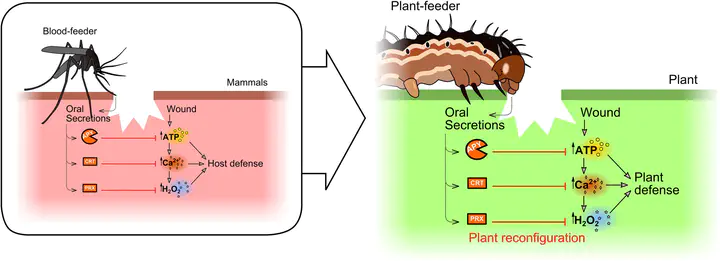Shared weapons of blood-and plant-feeding insects: surprising commonalities for manipulating hosts
 Image credit: [Antoine Guiguet]
Image credit: [Antoine Guiguet]Abstract
Insects that reprogram host plants during colonization remind us that the insect side of plant–insect story is just as interesting as the plant side. Insect effectors secreted by the salivary glands play an important role in plant reprogramming. Recent discoveries point to large numbers of salivary effectors being produced by a single herbivore species. Since genetic and functional characterization of effectors is an arduous task, narrowing the field of candidates is useful. We present ideas about types and functions of effectors from research on blood-feeding parasites and their mammalian hosts. Because of their importance for human health, blood-feeding parasites have more tools from genomics and other – omics than plant-feeding parasites. Four themes have emerged, (1) mechanical damage resulting from attack by blood-feeding parasites triggers “early danger signals” in mammalian hosts, which are mediated by eATP, calcium, and hydrogen peroxide, (2) mammalian hosts need to modulate their immune responses to the three “early danger signals” and use apyrases, calreticulins, and peroxiredoxins, respectively, to achieve this, (3) blood-feeding parasites, like their mammalian hosts, rely on some of the same “early danger signals” and modulate their immune responses using the same proteins, and (4) blood-feeding parasites deploy apyrases, calreticulins, and peroxiredoxins in their saliva to manipulate the “danger signals” of their mammalian hosts. We review emerging evidence that plant-feeding insects also interfere with “early danger signals” of their hosts by deploying apyrases, calreticulins and peroxiredoxins in saliva. Given emerging links between these molecules, and plant growth and defense, we propose that these effectors interfere with phytohormone signaling, and therefore have a special importance for gall-inducing and leaf-mining insects, which manipulate host-plants to create better food and shelter.